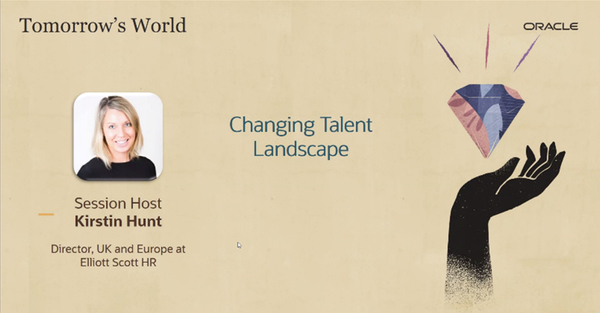Drop off your CV
We serve the global HR community through our offices located in Delhi, Hong Kong, London, New York, São Paulo and Singapore and have placed HR leaders in over 30 countries.
I recently hosted an Oracle panel discussion as part of their 'Tomorrow's World for ...

I wanted to share some further insights from my HR network.
Hybrid Working
The shift to remote working is seemingly here to stay. Which leads me onto the return to the office…or not... Increasingly my conversations are all geared towards what the set up will be with the majority looking at some form of hybrid working, but for those who vehemently say there will be no flexible working what will this mean for talent retention and attraction? The majority have got used to a much more flexible way of working without the lengthy commutes.
Undoubtedly the last 12 months have also put an increased focus on the Inclusion and Diversity agenda and as we shift to a hybrid working model the focus on Inclusion is more paramount than ever. Also from the Diversity and Equality lens we have to consider what the move to a more flexible working model has done for working mothers now able to continue their careers in the industry. Also there is certainly a rise in the importance of psychological safety and a culture of inclusion, innovation and also transparency. For example, Millennials want to work for firms that add purpose and value to their lives, so when looking ahead, they are thinking about transparency, accountability and inclusion. Learning and Development Furthermore, with the focus on a more virtual set up, there are a lot of discussions around upskilling managers to ensure they are better equipped to support their teams remotely and in making sure performance is upheld. So, there is already quite a big impact on Learning and development with more meaningful learning. Companies have allocated performance coaches to have continuous 1 to 1s and a lot of questions are being asked around “what does digital leadership look like”? Also, encouraging leaders to listen more and to adopt a purpose-driven leadership style.
Talent Diversity
We have also seen an acceleration in the push for Diversity in the talent and candidate pool, largely on the back of Black Lives Matter and now for CEOs to be accountable for their businesses and to action some practical diversity measures. To enable this recruitment teams have been set up dedicated to delivering a more diverse talent pool. When talking to some clients, we are seeing more flexibility on where roles can be based, with locations being taken off job descriptions, and one hopes this will also open up the candidate pool. We must also be mindful of the importance of data and analytics, especially when managing an international workforce and in recognising the legal implications that may arise when collating information about employees between different jurisdictions. HR need to act sensibly, being aware of regional regulations and tailor their surveys and strategies not only from a cultural perspective but also from a legislative one.
Mental and Physical Health Communication flows have become much more open and transparent as leaders have had to be more sensitive to the stresses of the pandemic and mental & physical health. This year, we are seeing new positions being created within businesses such as Wellbeing Managers, which is a real positive on the back of the challenging last 12 months. Businesses are now starting to offer “Wellbeing days” to give their employees a much-needed break from laptops and virtual meetings.
Digital Transformation
We also need to consider digital transformation, which isn’t completely new; technology was replacing outdated workplace processes long before the pandemic. However, the sudden shift to remote working has forced us to take meetings, brainstorms, and even our Christmas parties online! Experts believe this momentum will continue as AI and machine learning create improvements to set us up for longer-term remote working. Many employers are also investing in their staff to upskill or reskill, decreasing the digital skills gap. According to a recent Talent Trends report, “upskilling should still be seen as a strategic priority alongside technology investments.”
So, in summary, employees are now much more focused on the organisational culture and how they are treated and recognised. In my mind, it will be those employers who have gone above and beyond in the last 12 months, who have a strong focus on their company culture and values, who will be in a stronger position to retain and attract good talent.
Thank you to Oracle for asking me to join the panel discussion. If you would like to get in touch to discuss the above further, your next HR role, or are looking to add to your team, you can do so via LinkedIn or at kh@elliottscotthr.com